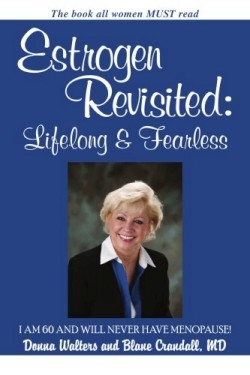Estrogen Revisited
Lifelong & Fearless, First Edition
Contradicting current medical theories this book advocates lifelong hormone replacement therapy (HRT) for women. Its arguments however fall far short. Co-authors Walters a woman who has been on HRT for more than thirty years and Crandall an OB/GYN and active HRT advocate present only one point of view—and that incompletely if passionately.
Citing her own experience as proof that estrogen can arrest aging Walters credits her appearance and health to HRT. She plans to stay on estrogen she says for life and encourages other women to consider doing the same and to avoid menopause altogether by beginning estrogen therapy before its onset. Her portion of the book is tediously repetitive even contradictory as she claims not to advocate any particular course of action yet constantly attributes her “youthfulness” to HRT.
Both authors condemn the conclusions of the NIH’s Women’s Health Initiative study. Crandall reinterprets the study data in his portion of the book. His interpretations raise more questions for the lay reader than they answer—including his statement that a “woman…should take estrogen so if she develops cancer it will be identified earlier and have a better prognosis.” He also says taking a woman off HRT to reduce health risk “is…as absurd as castrating men to improve their health.”
Readers expecting balanced discussion will be disappointed; the book focuses on how women might retain their “femininity” (read sexual desirability) optimism energy and looks through HRT lest their marriages suffer as they age prematurely due to the “disease” of menopause.
Both authors believe menopause can be “cured” and women need never experience it. Crandall exhorts “read this book and save your life by demanding the hormones you deserve.” He further urges men to encourage their wives to have estrogen therapy so they will “grow old with you and not before you.” Walters cites the controversial forty-two-year-old Feminine Forever by Robert A. Wilson in which Wilson terms menopause a “deficiency disease” believing says Walters “menopause often ruins a woman’s character along with her health.” Estrogen could preserve the “harmony” in a woman’s marriage and thus improve the lot of everyone around her.
While Crandall’s portion is filled with dosages and specific pharmaceuticals (he “has received speaker fees and training from Pfizer and Novartis…[but] never received a grant or salary from the NIH”) there’s barely any talk of natural menopause or women who forgo HRT. The book suffers as well from poor editing which could have eliminated spelling errors and much of the repetition.
Walters makes two valid points: not enough research is being done on women’s health issues and one method of therapy is not appropriate for everyone. But those are lost in the larger advocacy of HRT. The reader comes away with the message that estrogen therapy is a woman’s fountain of youth.
Reviewed by
Marlene Satter
Disclosure: This article is not an endorsement, but a review. The publisher of this book provided free copies of the book and paid a small fee to have their book reviewed by a professional reviewer. Foreword Reviews and Clarion Reviews make no guarantee that the publisher will receive a positive review. Foreword Magazine, Inc. is disclosing this in accordance with the Federal Trade Commission’s 16 CFR, Part 255.

